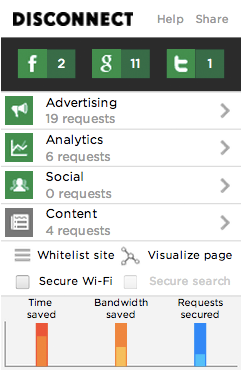Battle Over Data: Disconnect 2 Lets Users Block Tracking On More Than 2,000 Websites
It’s an ongoing challenge for marketers: users say they don’t like to be tracked, but they also say they prefer getting relevant ads and messages as they use the Web. This battle over data extends into several marketing areas — search, social media, email and more. Part of this mix is third-party tools that get […]

Part of this mix is third-party tools that get in the middle by letting users prevent websites from tracking their behavior.
One such tool, Disconnect.me, just announced a substantial upgrade: The second version of its app — an extension that works in Chrome, Firefox and Safari browsers — lets users see and block more than 2,000 websites that track their online behavior.
And it’s not only about privacy; the company is promoting the app by saying that webpages load 27 percent faster when the extension is turned on.
The database of websites that it tracks is updated automatically and the companies that collect personal info are shown in real-time as a web page loads. This company video shows how the app works:
Also troublesome for marketers, and not mentioned in the video, is the fact that Disconnect.me also functions as an ad blocker.
On the bright side, users can easily unblock individual websites and/or categories of sites. And, as GigaOM correctly points out, tools like this are far from mainstream and many web users aren’t even aware of the tracking/privacy issue in the first place. In October, one study revealed that only 13 percent of U.S. web users were aware of the “Do Not Track” initiative, for example.
Disconnect was launched in 2010 by a former Google engineer, Brian Kennish, and consumer right attorney Casey Oppenheim.
Opinions expressed in this article are those of the guest author and not necessarily MarTech. Staff authors are listed here.
Related stories